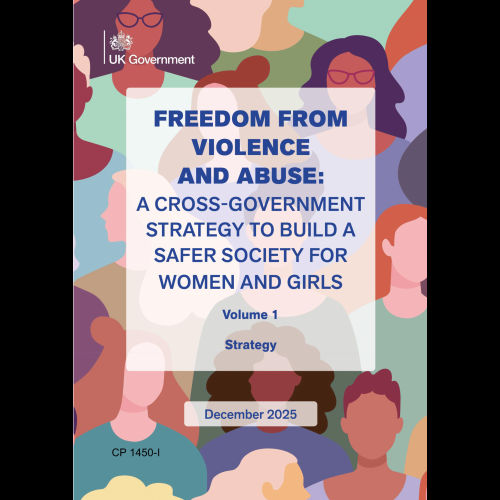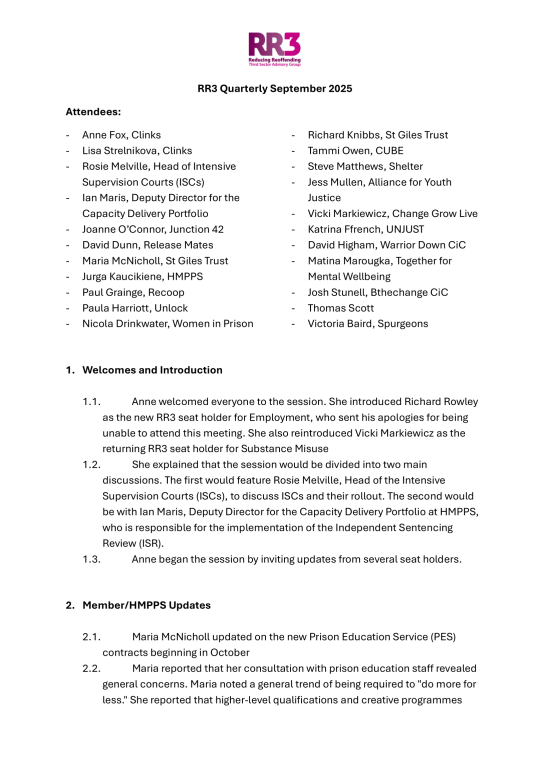The Ministry of Justice (MoJ) has announced an important stage of the probation reform programme - that qualification for the dynamic framework will launch later this month. This blog takes a look at the materials published by the MoJ alongside this announcement, and how charities interested in being commissioned under the new probation system from summer 2021 can get involved.
What is ‘qualification’?
The dynamic framework is the mechanism through which rehabilitation and resettlement interventions will be procured for the future probation model. The framework is the main opportunity for voluntary organisations of all sizes to deliver services through the new probation system.
Qualification is the process by which organisations apply to be on the framework. Qualification onto the framework will be a relatively light touch process, requiring organisations to:
- Demonstrate experience and provide case studies relevant to the need category that they are interested in, as well as answering standard selection criteria (e.g. essential information about the organisation; whether there have been convictions for fraud or corruption)
- Accept the standard framework agreement which contains various terms and conditions which will apply to any contracts and grants awarded under the framework
- State their geographic areas of interest (though this will not be assessed until call-off).
Organisations will receive feedback on unsuccessful bids. After an unsuccessful bid, they will have two more attempts to bid for a place on the dynamic framework. If the organisation is unsuccessful after the third bid, there will be a six-month period before they can bid to be on the framework again.
What services will be commissioned through the dynamic framework?
The dynamic framework will be used to commission all future rehabilitative and resettlement services for individuals under probation supervision.
The framework is expected to be launched later this month and exist for seven years, extendable up to three years. The following service categories will be fixed for the duration of the framework - so only services falling within these categories can be commissioned:
- Accommodation
- Employment, Training, Education (ETE)
- Finance, Benefits, Debt (FBD)
- Dependency and Recovery
- Family and Significant Others
- Lifestyle and Associates
- Emotional Wellbeing
- Social Inclusion
- Cognitive and Behavioural Change
- Women
- Young Adults (18-25 years old)
- Black, Asian and Minority Ethnic (BAME)
- Restorative Justice
- Service User Involvement.
Contracts for some of these categories will be commissioned centrally by the Ministry of Justice in advance of the new probation model going live, to ensure that they are available on day one of the new model.
Further to these day one call-offs, there are also a number of ways that future or additional services can be commissioned or ‘called off‘:
- National Probation Service (NPS) regional probation directors could re-commission similar services to those for day one but targetted at specific cohorts; or commission additional services that might be specialist, locally-specific or more outcomes-focused, for instance using their regional outcomes and innovation fund
- Other commissioners could commission services or services could also be co-commissioned using other commissioners' alternative procurement routes
- Any of the above could start to be commissioned at any time from the framework launch to its end, however a certain amount of activities are required before a service would be ready to commence, including a minimum period of mobilisation and transition - usually six months.
Call-off process
The MoJ will pre-announce when it intends to run a call-off for each lot, to give organisations who are not yet qualified the opportunity to qualify before the call-off is launched. The basic process for call-off will be:
- When a commissioner (NPS or other) wishes to call-off services, they will set out their requirements and the call-off terms and conditions and then invite bids from all suppliers who are pre-qualified for that need and geographic area
- Bids will then be evaluated, and call-off contracts awarded, in line with the requirements and methodology options contained within the framework agreement (e.g. there will be options, which must be selected at call-off stage, as to which payment mechanism to use or which evaluation method to use).
Market warming materials
The MoJ has published two tranches of market warming materials in advance of launching the qualification process.
These include:
- How to access Jaggaer
- Overview of material – navigation guide for all material to be updated whenever documents are added or updated
- Overview of the framework, glossary etc.
- FAQs (further questions will be added along with each tranche of new information)
- Selection Questionnaire overview and clarification process
- Economic and financial standing, performance and financial guarantees, financial distress, liability
- Partnering / consortium forming guidance
- Pay, performance & contract levers (in framework agreement)
- Evaluation (in framework agreement; this is only broad options).
The materials are being hosted on Jaggaer (the MoJ’s esourcing portal - formerly Bravo). To access documents, organisations need to log in to the system. If you do not already have an account you will need to register here. If you are unsure whether you already have an account, you can email esourcing@Justice.gov.uk and the team will check for you.
Once you are logged in, follow these steps:
- Click on ‘PQQs open to all suppliers’.
- In the search bar type ‘Probation Dynamic Framework Market Warming’. Click on the event titled ‘PQQ_199 - Probation Dynamic Framework Market Warming’.
- Click ‘Express an Interest’ in the green box.
- Relevant information can be found under ‘Buyer Attachment’ and ‘My Response’.
What next for the probation reform programme?
The Reducing Reoffending Third Sector Advisory Group (RR3), a formal advisory group to government, recently coordinated a meeting with officials and senior leaders from the voluntary sector to provide advice on the dynamic framework. You can read a summary of that meeting here.
In the context of Covid-19, voluntary organisations expressed concerns about the MoJ conducting a major new commissioning process at this time, as many organisations do not have the capacity to engage in work beyond service delivery. Many have had to adapt their services, redeploy staff to the front line or furlough business development staff. Many more are facing financial uncertainty over the coming months.
Given these pressures, the RR3 recommended to officials that Clinks and the voluntary sector needed to have a meaningful say in any decision taken that the market is ready for call-off. ‘Market readiness’ in this context must be the point at which the sector in all its diversity is ready to bid, to ensure a fair and open process that secures the best possible services for service users. While the market engagement material states that the MoJ are “considering the impact of Covid-19 on market capacity”, we will seek further assurances of what processes will be put in place to ensure voluntary organisations are able to engage in this process.
What's new
Blogs
Violence Against Women and Girls (VAWG) Strategy Blog
Publications
Latest on X
The role is for a leader from an organisation focused on racially minoritised people, with expertise in service delivery, policy, advocacy, or related areas in criminal justice. Racial disparities are present at every CJS stage. This role ensures these voices are central in shaping policy to help address and eradicate them. Apply by Mon 18 Nov, 10am. More info: https://www.clinks.org/voluntary-community-sector/vacancies/15566 #CriminalJustice #RR3 #RacialEquity

